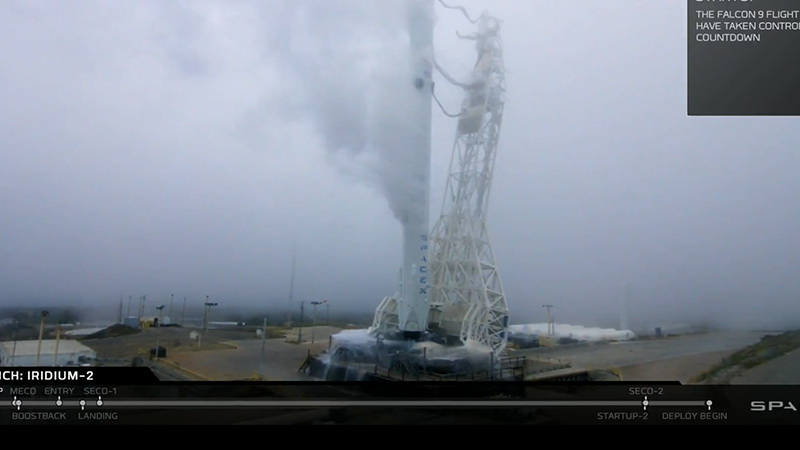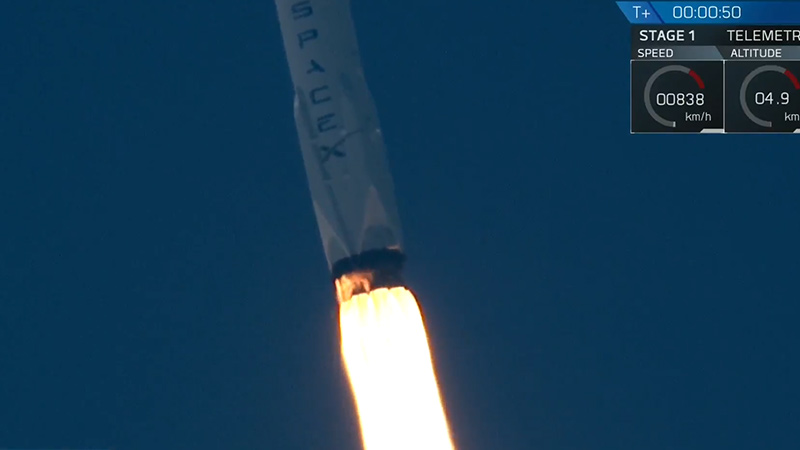10 additional Iridium satellites reach orbit
By Debra Werner|June 25, 2017
SpaceX confirmed release into orbit today of 10 satellites for Iridium Communications in a milestone for Iridium’s campaign to update its constellation of global telecommunications satellites and for Aireon, Iridium’s partner preparing to track aircraft worldwide with receivers on each satellite.
“Right now, it’s two down with six more launches to go,” said Iridium CEO Matt Desch in a news release. “Our operations team is eagerly awaiting this new batch of satellites and is ready to begin the testing and validation process.”
A Falcon 9 rocket blasted off from Vandenberg Air Force Base in California just after 1:25 p.m. Pacific time.
The SpaceX live stream showed the Falcon 9 rocket taking off through thick fog enveloping the California coast to reach blue sky before the rocket’s first stage separated and headed back into the fog, landing nearly eight minutes later on a SpaceX platform floating in the Pacific Ocean.
Sunday’s launch was the second of eight Falcon 9 flights Iridium is buying to send its next generation of 75 communications satellites into low Earth orbit. Aireon is a joint venture of Iridium and the air navigation service providers of Canada, Ireland, Italy and Denmark. Each Iridium NEXT has an Automatic Dependent Surveillance-Broadcast receiver to gather data airplanes transmit on their locations and vertical air speeds.
Although Iridium and Aireon won’t be able to offer global communications services until SpaceX finishes launching Iridium satellites in 2018 under the current schedule, the firms test their nascent networks with the satellites.
“Amazing,” Aireon tweeted with the hashtag PathtoOperations.
Since April, Aireon has pinpointed the location of aircraft more than 1 billion times per month with the eight active receivers on 10 of the Iridium satellites SpaceX launched Jan. 14. “The more satellites we put in place, the more we can start validating the network on a worldwide basis,” Aireon CEO Don Thoma said at a prelaunch briefing.
Aireon will take control of the receivers launched today in approximately 45 days, after Iridium moves the new satellites into its constellation and verifies they work properly.
After four or five more launches, Aireon and its partner Flight Aware will begin offering a service called Global Beacon to help airliners report their positions every 15 minutes and comply with rules the United Nations’ International Civil Aviation Organization established in the wake of the 2014 disappearance of Malaysia Airlines Flight MH370. Soon after that, Aireon will be able to continually track aircraft over the North Pole, an area with growing traffic and little terrestrial radar, Thoma said during the briefing.
Elon Musk, SpaceX founder and chief executive, celebrated Sunday’s second Falcon 9 first stage landing in two days with an Instagram video of the booster touching down on the SpaceX ship named Just Read the Instructions. “Guess it did,” Musk quipped.
On June 23, a SpaceX Falcon 9 blasted off from Cape Canaveral to send a Bulgarian communications satellite into low Earth orbit on a rocket that reused the first stage from Iridium’s January flight. It was the second time SpaceX reused a booster, a strategy SpaceX adopted to reduce the cost of spaceflight.
“Down the road, [the boosters] will not even be repainted between launches,” Musk tweeted today. “Aiming to be able to relaunch same orbital rocket booster in <24 hours.”
Related Topics
Commercial SpaceflightSpacecraft PropulsionAir Traffic Management and ControlCommercial Aircraft





